Islamabad 15 August: Pakistan has reportedly reached an agreement to finalize debt re-profiling arrangements with Chinese Independent Power Producers (IPPs) in a major move to ease the burden on its struggling power sector.
The federal government had previously initiated negotiations to restructure approximately $15 billion in energy sector liabilities tied to Chinese IPPs, proposing a five-year extension in repayment timelines. This restructuring aims to provide fiscal relief, improve debt sustainability, and reduce electricity tariffs for consumers.
A dedicated Power Sector Financing Steering Committee, chaired by the finance minister and comprising key federal officials, was established to oversee the negotiations. Islamabad sought to stagger repayments through 2041, easing annual pressure on government finances and enabling potential reductions in electricity prices ranging from Rs 2 to Rs 3 per unit.
READ MORE: Record-breaking power sector reforms,Senate hails Rs191bn loss cut
Authorities also explored conversion of coal-based Chinese power plants—from imported to locally sourced coal—as a complementary strategy to lower operational costs and reduce reliance on costly fuel imports.
Finance Minister Muhammad Aurangzeb described responses from Chinese counterparts as “promising,” signaling progress in reaching a mutually agreeable arrangement. Meanwhile, Power Minister Awais Leghari emphasized that these reforms—debt re-profiling and coal sourcing—are central to Pakistan’s broader economic and energy restructuring efforts.
The timing of this agreement comes amid heightened scrutiny from international lenders. Last year, the World Bank’s private finance arm and other development finance institutions cautioned that Pakistan’s renegotiations of energy contracts could undermine investor confidence and future private investment.
If implemented, the finalized scheme would represent a critical win for Pakistan’s power sector—reducing the fiscal strain, containing circular debt, and positioning the country toward more sustainable energy economics.









